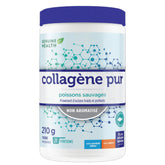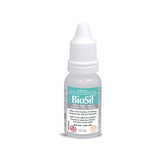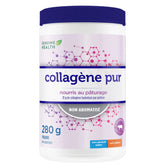In recent years, collagen supplements have appeared on the market in a variety of forms. Initially touted for its benefits on the appearance of wrinkles and aesthetic health, collagen quickly proved its worth as a health ally.
Collagen is a dietary supplement that gained its popularity largely by making a name for itself in joint recovery.
You're probably wondering which collagen to choose: marine or bovine? Keep reading, we'll get to it!
Familiarize yourself with us about the benefits of collagen, the body's most abundant protein, and find out how to choose the best collagen for you.
What is collagen?
The word 'collagen' comes from the Greek 'kolla' meaning 'glue' and 'gene' meaning 'that engenders'. Collagen is defined as the glue that holds all the body's connective tissues together, including skin, hair, bones, muscles, tendons, ligaments and more.
Collagen is the most abundant protein in the human body. It can be compared to the cement that holds together the various components of the body. As such, it ensures the body's stability by maintaining its structure. It is firm, resistant, insoluble and comparable to steel. Skin collagen, for example, provides strength and elasticity. There are some 16 types of collagen, 90% of which consist of types I, II and III..
Collagen: an abundant protein
Proteins are blocks of amino acids that come together to form a variety of structures. In the body, collagen is the most abundant protein. It is found in most body tissues, from skin and hair to muscles, cartilage, bones, teeth and blood vessels. Collagen is a protein that contributes to the integrity of body tissues and structures, helping them to form, develop and maintain.
Diet provides the body with all the nutrients it needs to manufacture collagen. Vitamin C and specific amino acids such as proline and glycine are essential for collagen production. Although the body maintains its integrity through collagen formation, collagen formation declines with age.
Already in our twenties, the body slows down its production of collagen. One of the first signs is the appearance of fine lines. Over time, collagen production declines by 1% per year. It then becomes necessary to supplement with collagen to maintain a strong, supple and healthy body.
Why take collagen?
This protein has been extensively studied in recent years. Researchers associate collagen with health:
- Skin : Collagen plays an important role in maintaining skin elasticity and hydration. This protein firms the skin while reducing the formation and appearance of wrinkles.1
- Articular : Collagen maintains the integrity of cartilage, the elastic connective tissue that lines joints. As collagen production declines, joints become more prone to inflammation and joint degeneration, contributing to pain and loss of movement. Taking collagen slows this degeneration and helps support the body during joint injuries. 2, 3
- Bone : Bones are mainly made of collagen, on which minerals are deposited. To support the structure and strength of the bone matrix, it is essential to maintain optimal collagen levels. It's a supplement that's not often recommended for osteoporosis and fractures, yet it's essential for bone health. 4
- Cardiovascular : Collagen ensures the strength and flexibility of the arteries. Without optimal collagen levels, arteries can become fragile, providing a breeding ground for the development of cardiovascular diseases such as arteriosclerosis. Studies have shown that collagen supplementation maintains arterial health. 5
- Muscular : Muscular health is necessary for proper body function, including strength, endurance and postural health. Collagen makes up around 10% of muscle tissue. Taking collagen helps build and maintain muscle mass, as well as improving recovery from intense training or muscular injury. 6, 3
- Hair and nails: Collagen is an important protein for the strength of these tissues. Collagen intake reduces nail and hair fragility by 42%, and accelerates hair and nail growth. 7
What are the different types of collagen?
- Type IThe most abundant in the body. The strongest and most resistant found in tendons, bones, skin, etc.
- Type II, IX, X, XIFound in cartilage.
- Type IIICommon in fast-growing tissues, particularly in the early stages of wound healing, and is subsequently replaced by type I collagen.
- Type IVCapillary membrane.
- Type V, VI: Usually found alongside type I collagen.
- Type VII Epithelial cells lining the digestive tract, urinary tract and vaginal wall
- Type VIIIblood vessel lining.1
Articular cartilage covers the ends of our bones, while joints such as the knees have additional cartilage that acts as a cushion between the bones. Cartilage is essentially made up of collagen fibers, glycoproteins and proteoglycans. The structural integrity of human cartilage follows a continuous cycle of construction and deterioration. Our body must rebuild cartilage at the same rate as it deteriorates to maintain healthy joints. When the joint starts to wear out, due to accelerated deterioration to the detriment of reconstruction, cartilage production slows down, leading to inflammation.4
Our bodies naturally produce collagen, and it's from our twenties onwards that they produce less. Factors intrinsic to our lifestyles lead to a more rapid loss of collagen. When collagen production declines, symptoms appear.
Examples include dry skin with the appearance of wrinkles, painful joints that prevent you from moving around, reduced bone density, osteoarthritis and loose teeth, all of which are signs of reduced collagen production.5
When is collagen lacking?
- Diet: diet low in green vegetables and high in caffeine, black tea, soft drinks, etc.
- Excess weight
- Lack of hydration
- Stress, with persistently high cortisol levels
- Excessive sun exposure and UV damage
- exposure to chemicals, alcohol, drugs and medication
- A condition that maintains an acidic pH, such as stress, a diet lacking in green vegetables, lack of clean air, etc.
- Lack of physical exercise
- hormonal changes such as menopause.2,3
What type of collagen should I choose?
The good news is that it is possible to reverse a collagen-losing condition by consuming it. There are different types of collagen supplements. There is, for example, type II collagen from chicken, bovine or porcine sources. Type I, II, III and VI collagen from hydrolyzed marine collagen.5
Genuine Health offers type I, II, III collagens necessary to nourish cartilage which may or may not be showing symptoms of wear. These products are available prepared with hydrolyzed pure bovine collagen from grass-fed, pasture-raised USDA (U.S. Department of Agriculture) cattle. There's also pure hydrolyzed marine collagenfrom wild-caught fish in the North Atlantic.5
For vegetarians and vegans, silica is a trace element ubiquitous in nature, found in horsetail, bamboo and nettle. Silica appears to act directly on the cells that synthesize collagen, namely osteoblasts (bone-forming cells). By participating in collagen synthesis, silica helps to tone all body structures. In the bone, in addition to improving the protein framework, it has a predominant effect on mineral density.2
Consider collagen synthesis when choosing the type of silica you need.
Supplementation with calcium, magnesium and vitamin D is essential to support collagen synthesis. Vitamin K is also required to produce osteocalcin, a protein found in large quantities inside bone. Add to this little cocktail boron for bone metabolism and zinc, essential for vitamin D synergy..4
Here are 5 ways to take collagen to maximize its benefits
To reap the benefits of collagen, we recommend that you supplement your body with collagen, since collagen production slows down over the years. Depending on your diet and beliefs, you'll need to choose from the following 5 options:
Diet and collagen: what to eat?
Food is a good first source of collagen. Some foods contain collagen naturally, such as bone brothchicken and pork skin. Other foods provide important nutrients that stimulate the formation of collagen formation including vitamin C, glycine and proline. A diet rich and varied in animal and vegetable proteins (meat, fish, nuts, legumes) and vitamin C-containing fruits and vegetables (citrus fruits, tomatoes, peppers, green vegetables, squash, berries) will support the formation of natural collagen.
Over time, however, the body becomes less efficient at synthesizing nutrients into collagen. That's why you need to turn to a highly assimilable and bioavailable dietary supplement.
Bovine collagen
Highly assimilable and more affordable than some other options, bovine collagen is most often sold in hydrolyzed form. This soluble white powder mixes well with many beverages, including smoothies, juices, matcha or coffee. Be sure to opt for collagen derived from grass-fed cows on a diet free from GMOs (genetically modified organisms), hormones and antibiotics. A therapeutic dose ranges from 5g to 12g a day.
Marine collagen
This collagen comes from fish skin. It's an effective way of obtaining a highly assimilable source of collagen without contributing to mass cattle farming. Check that marine collagen comes from a wild, sustainable fishery. Like bovine collagen, the intake of marine collagen should be 5g to 12g a day to ensure its effectiveness.
Plant collagen substitute
Collagen substitutes are mineral and plant formulas that support the body's natural collagen production. These formulas are generally vegan and gluten-free. Examples include Bambousila plant-based formula with bamboo silica, vitamins and minerals.
Collagen activator
Collagen activators stimulate and activate collagen-generating cells, the fibroblasts. The secret of this activation method is its chemical formula, choline-stabilized orthosilicic acid (ch-OSA). Double-blind, placebo-controlled trials have demonstrated the efficacy of collagen activators such as Biosil. It's a vegan, eco-friendly way to maintain a healthy, youthful body.
Thanks to the collagen dietary supplement, you'll be able to maintain long-term health while reducing the signs of aging.
We wish you good health,
About the author
Naturopaths of La Boite à Grains
Team of licensed and certified naturopaths (ND) in Gatineau, Outaouais.
Original article written by Véronique Cousineau, Naturopath
Sources
- Ganceviciene R, Liakou AI, Theodoridis A, Makrantonaki E, Zouboulis CC. Skin anti-aging strategies. Dermatoendocrinol. 2012 Jul 1;4(3):308-19.
- Elisângela Porfírio, Gustavo Bernardes Fanaro. Collagen supplementation as a complementary therapy for the prevention and treatment of osteoporosis and osteoarthritis: a systematic review. Rev. Bras. Geriatr. Gerontol, Rio de Janeiro, 2016; 19(1):153-164
- Lopez, et al. Evaluation of the Effects of BioCell Collagena Novel Cartilage Extract, on Connective Tissue Support and Functional Recovery From Exercise. Integr Med. 2015 Jun;14(3):30-8.
- S. Viguet-Carrin, P. Garnero, P. D. Delmas. The role of collagen in bone strength. Osteoporosis Int. 2006; 17(3): 319-336. 2005 Dec 9.
- Lodish H, Berk A, Zipursky SL, et al. Molecular Cell Biology. 4th edition. New York: W. H. Freeman; 2000. Section 22.3, Collagen: The Fibrous Proteins of the Matrix.
- Gillies, Allison R, and Richard L Lieber. "Structure and function of the skeletal muscle extracellular matrix." Muscle & nerve vol. 44.3 (2011): 318-31. doi:10.1002/mus.22094
- Doris Hexsel, Vivian Zague, Michael Schunck, Carolina Siega, Fernanda O. Camozzato, Steffen Oesser. Oral supplementation with specific bioactive collagen peptides improves nail growth and reduces symptoms of brittle nails. J Cosmet Dermatol. 2017 Aug 8 2017.
- Braun Dr. Martin, M.D., Vanderhaeghe Lorna R., Beautiful Skin begins WithinKrista Belli and Lisa Fukushima, 2014, 131 pages
- Dionne Jean-Yves S.O.S. Strong bones at any age! Wiley, 2008, 132 pages
- Graci Sam, The Bone-Building SolutionWiley, 2006, 392 pages
- Strand Ray D. M.D. What your doctor doesn't know about nutritional medicine could be fatal to you, Ed. Du Trésor Caché, 2002, 274 pages
- https://www.genuinehealth.com/en-ca/products/collagen/








